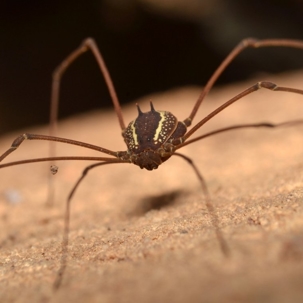Are Daddy Long Legs Poisonous Or Venomous?
Daddy long legs are not poisonous, nor are they venomous.
Are Daddy Long Legs Poisonous?
No, daddy long legs (harvestmen, Opiliones) are not poisonous:
Harvestmen Physiology: Harvestmens' defensive secretions, while chemically active (e.g., benzoquinones, phenols), are not toxic in the sense of poisoning a predator. They primarily act as irritants or deterrents, causing bad taste, smell, or mild skin irritation.
Effect on Humans and Predators: Humans handling them may notice a strong odor or mild staining, but there is no systemic toxicity. Predators may avoid them due to unpleasant taste or irritation, but eating a harvestman is not inherently poisonous.
Harvestmen are not poisonous. Their survival strategy relies on physical escape (long legs, autotomy) and chemical deterrence, not true toxicity.
Are Daddy Long Legs Venomous?
Daddy long legs, or harvestmen (order Opiliones), are not venomous at all:
Venom Glands: Unlike spiders, harvestmen do not possess venom glands. They do not produce or inject venom, so there is no risk from a bite in that sense.
Fangs/Mouthparts: Harvestmen have small chelicerae (mouthparts), but these are adapted for crushing and eating small prey, plant material, or fungi. They cannot pierce human skin effectively, so bites are extremely rare and harmless.
Misconception: The common myth that “daddy long legs are the most venomous spiders in the world but their fangs are too short to bite humans” usually refers to cellar spiders (Pholcidae), not harvestmen. Harvestmen are a completely different order and have no venom at all.
Defensive Mechanisms: Instead of venom, harvestmen rely on other strategies to deter predators, like long legs that can detach (autotomy) to escape. Chemical secretions that can smell or taste unpleasant to predators, but are harmless to humans.
Human Interaction: Handling them may cause them stress, and they can secrete a mild, non-toxic fluid if threatened, but there is no danger to humans.
Harvestmen are completely safe for humans; the “venomous daddy long legs” warning is a persistent myth with no basis in biology.
Daddy Long Legs Secretions
The secretions of daddy long legs (harvestmen, order Opiliones) are a fascinating chemical defense system:
Nature of the Secretions: Harvestmen secrete chemical compounds from specialized glands called ozopores, located on the sides of their body (prosoma). The secretions are not venom; they are used primarily as a predator deterrent and sometimes for antimicrobial purposes.
Main Chemical Components: The secretions vary among species but generally include alkaloids, phenols, quinones, ketones, and acids. Common compounds identified in studies include benzoquinones (such as 1,4-benzoquinone or 2-methyl-1,4-benzoquinone), which are irritant, pungent, and can stain and deter predators, phenols, which contribute to the strong odor and taste deterrence, acetic acid or other short-chain acids , which can make the secretion irritating to mucous membranes of predators, and nitrogen-containing compounds, which may act as additional deterrents.
Predator deterrence: The secretion smells bad and can taste bitter or irritating.
Antimicrobial activity: Some compounds inhibit bacteria and fungi, protecting the harvestman from infection.
Visual/chemical warning: Coupled with leg autotomy, the secretion signals to predators that the harvestman is not worth eating.
Human Safety: These secretions are generally harmless to humans, though they may leave a temporary odor or stain on skin or clothing. They can cause mild irritation if they get in the eyes or on broken skin, but this is not toxic.
Harvestmen rely on a cocktail of pungent and irritating chemicals, rather than venom, to survive predation.
Daddy Long Legs Poison
The risks associated with daddy long legs (harvestmen) secretions are extremely low and largely limited to mild, localized irritation:
Skin Contact: The secretions contain chemicals like benzoquinones, phenols, and acids, which can be mildly irritating or staining. Direct contact may cause temporary skin redness or itching in sensitive individuals, and minor staining of skin or clothing, especially from benzoquinones. For most people, casual handling poses no significant risk.
Eye Contact: If secretions get into the eyes, they can cause burning, stinging, or irritation due to acidic or phenolic components. Flushing with water is usually sufficient; there is no lasting damage reported.
Ingestion: Accidental ingestion is highly unlikely due to their size and taste. The chemicals are not systemically toxic, but they can cause nausea or mild gastrointestinal discomfort if swallowed.
Allergic Reactions: Very rarely, people may experience contact dermatitis or a mild allergic reaction, but this is uncommon.
Environmental or Indirect Risks: Their secretions are primarily a predator deterrent and have no significant ecological or human health hazard. There are no reports of harvestmen causing serious poisoning, bites, or venom-related injuries.
For humans, the main “risk” is temporary irritation, mild skin staining, or odor, and they are otherwise completely harmless.

